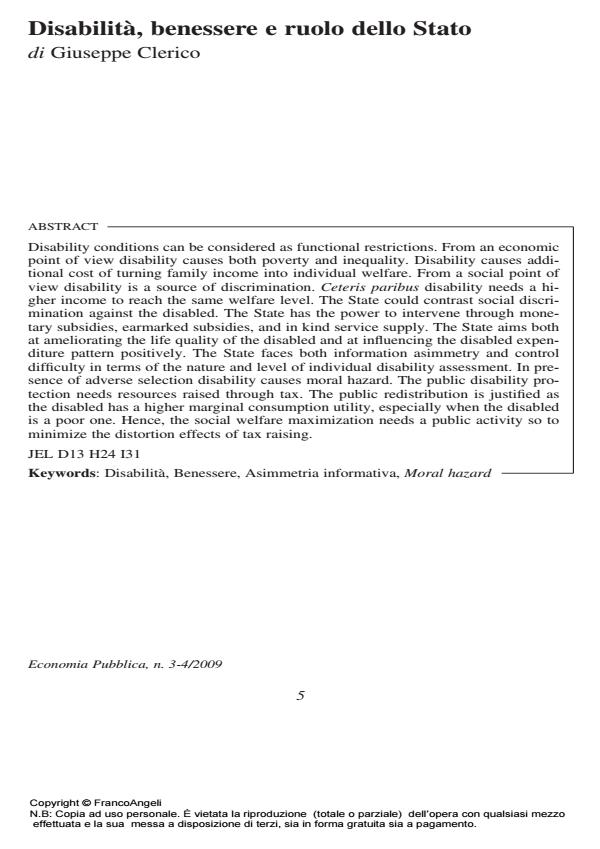Disabilità, benessere e ruolo dello Stato
Titolo Rivista ECONOMIA PUBBLICA
Autori/Curatori Giuseppe Clerico
Anno di pubblicazione 2010 Fascicolo 2009/3-4
Lingua Italiano Numero pagine 24 P. 5-28 Dimensione file 984 KB
DOI 10.3280/EP2009-003001
Il DOI è il codice a barre della proprietà intellettuale: per saperne di più
clicca qui
Qui sotto puoi vedere in anteprima la prima pagina di questo articolo.
Se questo articolo ti interessa, lo puoi acquistare (e scaricare in formato pdf) seguendo le facili indicazioni per acquistare il download credit. Acquista Download Credits per scaricare questo Articolo in formato PDF

FrancoAngeli è membro della Publishers International Linking Association, Inc (PILA)associazione indipendente e non profit per facilitare (attraverso i servizi tecnologici implementati da CrossRef.org) l’accesso degli studiosi ai contenuti digitali nelle pubblicazioni professionali e scientifiche
Disability conditions can be considered as functional restrictions. From an economic point of view disability causes both poverty and inequality. Disability causes additional cost of turning family income into individual welfare. From a social point of view disability is a source of discrimination. Ceteris paribus disability needs a higher income to reach the same welfare level. The State could contrast social discrimination against the disabled. The State has the power to intervene through monetary subsidies, earmarked subsidies, and in kind service supply. The State aims both at ameliorating the life quality of the disabled and at influencing the disabled expenditure pattern positively. The State faces both information asimmetry and control difficulty in terms of the nature and level of individual disability assessment. In presence of adverse selection disability causes moral hazard. The public disability protection needs resources raised through tax. The public redistribution is justified as the disabled has a higher marginal consumption utility, especially when the disabled is a poor one. Hence, the social welfare maximization needs a public activity so to minimize the distortion effects of tax raising.
Parole chiave:Disabilità, Benessere, Asimmetria informativa, Moral hazard
Jel codes:D13 H24 I31
Giuseppe Clerico, Disabilità, benessere e ruolo dello Stato in "ECONOMIA PUBBLICA " 3-4/2009, pp 5-28, DOI: 10.3280/EP2009-003001